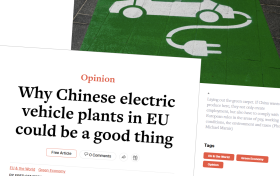
Op-ed: Why Chinese electric vehicle plants in EU could be a good thing

When Chinese carmakers want to start production inside the EU, this could finally create a level playingfield with domestic producers, I wrote in an op-ed in EUobserver.
Last month the European Commission announced it will impose additional taxes on electric vehicles produced in China. These are levies ranging from nine percent (Tesla) to as much as 36.3 percent (SAIC and other producers that do not cooperate in the commission’s investigation).
For the time being, attention is — understandably — focused on possible Chinese countermeasures that could possibly lead to a trade war.
Yet this development also offers an opportunity.
As production costs in China rise, intercontinental transport becomes more expensive and import duties are imposed, the difference between producing there and here becomes smaller and smaller.
We already see this happening in practice. Chinese car manufacturer Chery wants to build electric passenger cars in Spain together with the Spanish Ebro-EV Motors. To this end, a Nissan factory in Barcelona that was closed in 2021 will be reopened, creating work for thousands of employees.
Previously it was announced that China's largest manufacturer of electric vehicles, BYD, will starting production in Hungary. Also Xpeng is considering a European plant for its EV’s. And telecom equipment manufacturer Huawei is going to build a factory near Paris.
Turkey and Morocco
There are rivals outside EU too. BYD also announced last month that it wants to invest €900m in a factory in Turkey that will produce 150,000 EVs and hybrid passenger cars annually. And Chinese battery maker Gotion High Tech is investing €2.45bn in a giga factory in Morocco to serve the European carmakers market.
When China steadily developed into an economic superpower from 1979 onwards thanks to its open door policy, we considered this as just fine.
China cheaply assembled everything we needed for our homes and offices, from toys, furniture to electronics. We did not mind that this led to job losses. In any case, the disappearance of entire production sectors has not led to mass unemployment in the West. Our workforce started doing other things, which often yielded even more. This cut both ways: 300 million Chinese escaped poverty, while our prosperity and purchasing power increased due to the flow of cheap products from the Far East.
Then Chinese companies came here to make acquisitions. They were looking for returns, but also technological knowledge.
The realisation slowly grew that China would not settle for a place as the 'Factory of the World', but that it wants to develop and produce high-quality technological products. Critics point out that Chinese state aid and dumping as a result of overcapacity can destroy entire sectors in the West. Sectors on which we want to build our sustainable future, such as solar cells, wind turbines, batteries and EV’s.
Jobs, taxes, working conditions, environment
The new competition with China is therefore about our economic revenue model for the future and jobs. And now they want to invest in production capacity here.
In a way its encouraging that Chinese companies want to move part of their production to the European Union. If they want to produce here, they not only create employment, but also have to comply with European rules in the areas of pay, working conditions, the environment and taxes.
We are not going to have a more level playing field than this.
The levies on 'Made in China' therefore make it possible to compete more fairly not only on price, but on all relevant aspects of the production process. We should not leave this to countries close to the EU. We must embrace it ourselves.
If we want to make optimal use of Chinese capital and knowledge and prevent only countries on the edges of the Union are benefiting, member states should work together instead of competing each other.
Let's establish which regions urgently need economic strengthening and where youth unemployment is high.
What we should certainly not do is use the same instruments that we accuse the Chinese government of: offering cheap land, subsidies and tax benefits. Only by working together can governments set requirements in the areas of the environment, employment and labour rights and have companies contribute to education and work experience placements.
